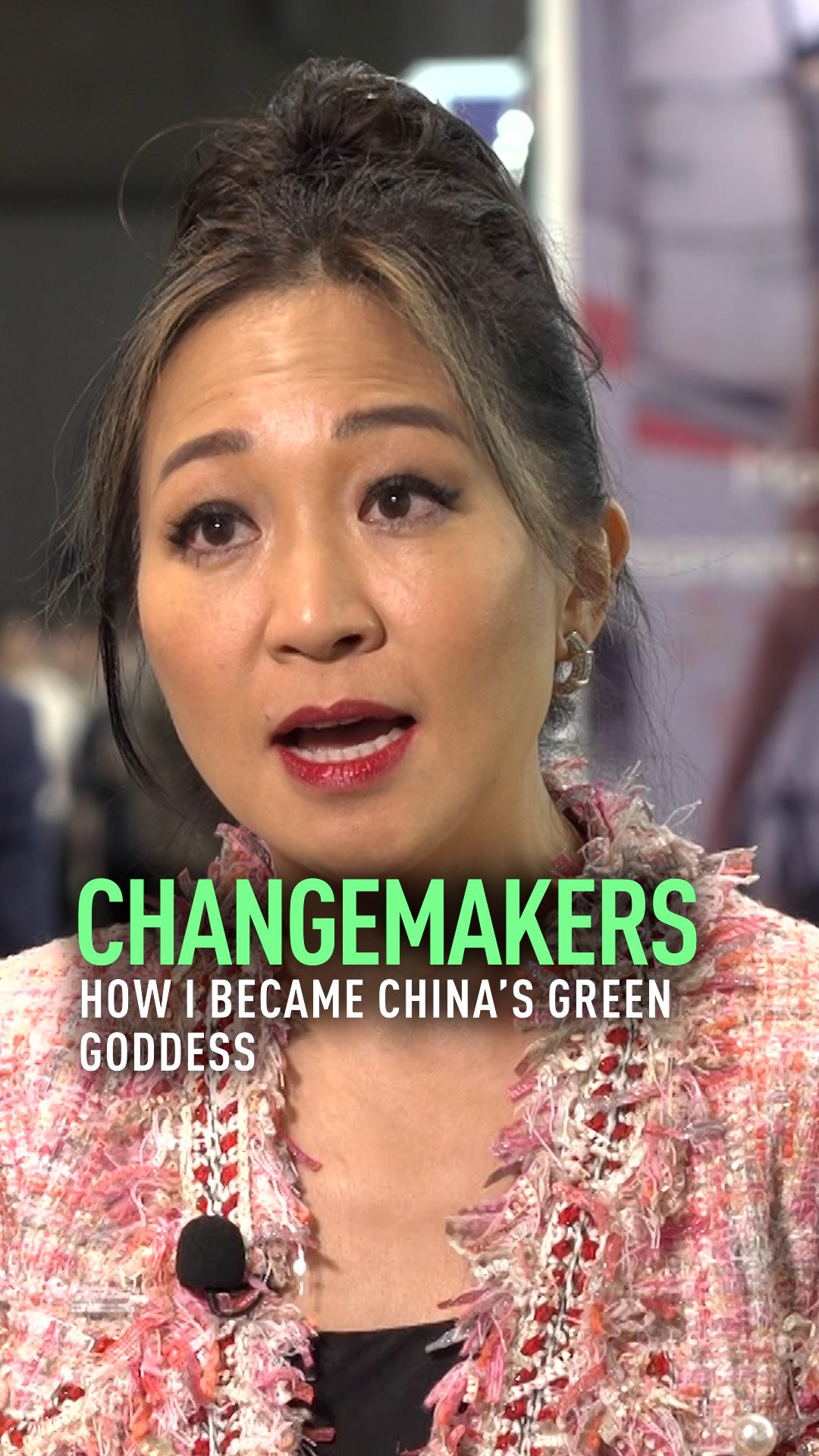01:12

She describes herself a master healer, the Chinese press call her the 'Green Goddess of China,' she descends from a Taoist grand master, her work has transformed China's green revolution and she seems to have inspired Elon Musk and Tesla's arrival in Shanghai.
It's quite the job profile for Peggy Liu, president of JUCCCE (Joint U.S.-China Collaboration on Clean Energy), who is seen across many business and society sectors as a key bridge for sustainable innovation and collaboration with China.
About her early career movements, Liu tells CGTN's Ken Browne in Madrid (where she's been for a global congress on 'sustainable mobility): "I was at the right place at the right time when China needed sort of a kick in the butt to go green.
"The first thing was catalyzing the clean energy revolution. I started in 2006 and that was really the time when China was just starting to even think about the words 'clean energy.' After the MIT Forum on the future of energy in China that I started, I went to the China state grid and I brought in the U.S. government who encouraged me to bring in U.S. technologies for smart grid."
Smart grid is an electricity supply network that uses digital communications technology to detect and react to local changes in usage.
Liu adds: "At the time, the word 'smart grid' didn't even exist in China. So I was inventing new vocabulary as I was going along as I was helping China go green. But lo and behold, three years later, China committed 7.2 billion U.S. dollars to go smart grid across the country by 2020. So big leaps like that got me the name China's Green Goddess."

Chinese car maker BYD was one of the stars at the Shanghai Auto Show in April./ CFP
Chinese car maker BYD was one of the stars at the Shanghai Auto Show in April./ CFP
Liu is clearly a high-flier. She is a World Economic Forum Young Global Leader and was awarded the 'Nobel' for climate change, while the Economist called her "one of Asia's most innovative thinkers." She has also educated 1000 Chinese government leaders (mayors and central government) on building sustainable cities and in 2013 launched 'Food Heroes' which teaches kids and parents about healthy diets.
The MIT Forum from which JUCCCE was formed has been instrumental in promoting public dialogue between the U.S. and Chinese government officials on clean energy in China. This concept of countries, businesses and individuals working together burns deeply inside Liu.
"I've worked in this space now for almost 15 years and the last decade is a very different geopolitical mindset than today," adds Liu who enjoyed watching China's car industry invite, encourage and finally embrace Elon Musk who was shocked to witness Shanghai build its first Tesla factory in the country in 2019.
"A major example of how anyone can look for what I call 'acupuncture points of collaboration' happened when I first got started in 2007.
"The U.S. government wanted to open up the Chinese market for their leading smart grid technologies. So they asked me to bring U.S. companies to China. Together with big American electrical and digital companies like Duke Energy, IBM, Cisco and many others, we created forums that brought people from both sides and other countries to ask what the future could look like if smart grid was a reality in China.
"In 2007, I drew a picture of what a smart grid could look like, and it had a little picture of an electric car. Initially the China state grid looked at me and they said 'What is this, an electric car? I think this is too sci-fi. Maybe you should come back in 10 years.'
"Of course, seven years after that, they were the leaders in the entire world. I think the trick is to look at layers. Every country and every company can find a niche that they work in to help the protocol work together at 7 to 8 levels.
"No one country is going to own the protocol, or the stack of applications. China happens to be really good at infrastructure. It makes the world's biggest metros, the world's biggest high speed rail network, the world's biggest bridges and others but not so good at end user applications.
"But Silicon Valley is really good at that. So let's work together. Another example is how the EU, like Madrid or Barcelona, work with Chinese companies' supply chain and making batteries. These are just some examples of how we can partner together in a productive way for the world."
READ MORE
Gaza aid set to stop over fuel as row erupts over Guterres
Gaza healthcare system on 'verge of complete collapse'
EXPLAINER: What happens when the fuel runs out in Gaza?
And if anybody is feeling a little gloomy about the future of this planet, then Liu has some calming words.
"The message I would give, especially to young people, is look at the statistics, and also look at the cycles of life," Liu says. "Everything goes through transformation. Everything goes through birth and death. There's no up without down. There is no lotus flower without mud.
"It's not about any one moment in time. It's about the continual transformation. Without one, the other cannot be. And so for young people, I would say 'don't freak out.' It's not all about doom. It's about looking to the future. It's about looking at the next transformation. It's about using your imagination, because all the solutions we have seen in the last decade or two or three were really hard to imagine for people before that.
"We can't possibly imagine Willy Wonka's chocolate factory of the future, if you're not Willy Wonka with great imagination. So I would say be hopeful, be optimistic. Most of all, be sure of your own ability to imagine a better future."

Subscribe to Storyboard: A weekly newsletter bringing you the best of CGTN every Friday